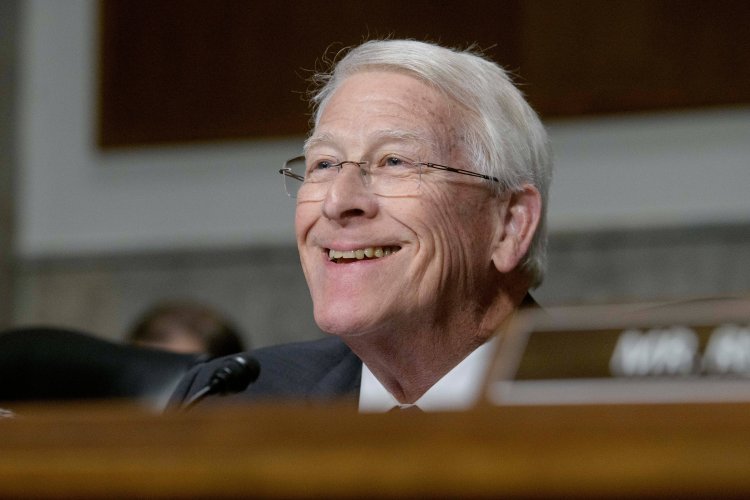A prominent Republican senator is defying Trump's team — and facing no consequences
The Senate Armed Services Chair has managed to satisfy the president while also challenging the administration's stance.

This strategy appears to be effective.
In recent months, the Mississippi Republican has opposed a potential withdrawal of U.S. troops from Europe, criticized Defense Secretary Pete Hegseth for undermining Ukraine during peace negotiations, and called for an investigation into the use of Signal by officials discussing military operations in Yemen.
These actions, particularly striking for a high-ranking lawmaker during any administration, are even more remarkable under Trump, who currently exerts considerable control over the GOP.
Throughout his lengthy career, Wicker has played a vital role in advancing Trump’s agenda—most notably by successfully navigating Hegseth’s controversial confirmation—while deftly assigning blame for unpopular Pentagon policies to “mid-level officials.” This balancing act illustrates how traditional GOP defense hawks are learning to manage the administration’s isolationist tendencies while pursuing their own more conventional objectives. Wicker's approach may provide a framework for fellow Republicans seeking to reconcile differing ideologies with a president who demands unwavering loyalty.
“Wicker has put himself in a very powerful place," remarked a Republican senator who spoke anonymously about a sensitive matter. “The Pentagon, the White House need him.”
Wicker has also engaged Trump in his initiatives. During a meeting at the White House in January, they discussed increasing defense spending, which Wicker refers to as a “generational investment” aimed at countering China.
His plan aims to elevate military spending to 5 percent of GDP, leading to an annual defense budget exceeding $1 trillion. Trump announced this month his intention to advocate for a record $1 trillion defense budget.
The senator believes he and Trump share a mutual understanding, particularly regarding Pentagon funding.
“President Trump and his administration have made national security a top priority and we have worked incredibly well together to advance America’s interests,” Wicker stated. “President Biden emboldened our adversaries abroad and left our border defenseless at home. Together, President Trump, Secretary Hegseth, and I are repairing that damage and advancing peace through strength.”
The 73-year-old Wicker, known for his low-key demeanor and preference for handling disagreements privately, represents the Republican establishment. His conflicts with the administration reflect the growing ideological divide within the GOP between traditional defense hawks and an emerging faction that questions long-standing U.S. commitments abroad, particularly in Europe and the Middle East.
He has been among the most vocal Senate Republicans advocating for arming Ukraine and cautioned against placing trust in Russian President Vladimir Putin, despite Trump’s suggestions for normalizing relations. Additionally, he criticized Hegseth in February for informing NATO allies that Ukraine could not reclaim its pre-war borders or join the alliance, calling it a “rookie mistake.”
Wicker teamed with House Armed Services Chair Mike Rogers to assert they would not endorse substantial cuts to U.S. troops in Europe or support a potential decision for the U.S. to step back from its long-held leadership role in NATO. This month, he dismissed the notion of troop reductions in Europe or South Korea during congressional hearings.
"This is a viewpoint with which I disagree,” Wicker said. “I'm troubled that this deeply misguided and dangerous view is held by some mid-level bureaucrats within the Defense Department.”
However, he refrained from directly criticizing Trump or Hegseth. Instead, Wicker attributed the unannounced proposals to officials who fail to grasp their leaders' vision.
"That just establishes Roger's street cred,” stated Sen. Kevin Cramer, a fellow Armed Services Committee member and Trump ally. “And I think the president sees it that way."
Wicker’s political standing contrasts sharply with that of another Republican hawk, Sen. Mitch McConnell. The former GOP leader, who currently heads the Senate Defense Appropriations panel, shares similar views with Wicker but has experienced a tumultuous relationship with the president and has taken a more confrontational stance towards the administration. McConnell’s objections to Hegseth and other nominees, as well as to tariffs on Canada, have drawn ire from Trump and his allies.
As Armed Services chair, Wicker has also ensured that the president benefits from his backing. He played a crucial role in Hegseth’s confirmation, which at one point seemed precarious due to allegations of sexual misconduct and alcohol abuse that Hegseth denied.
Wicker urged the Senate to remain in session “as long as it takes” to confirm Gen. Dan Caine, rejecting Democratic resistance to Trump’s nominee for Joint Chiefs chair.
His calculated pushback has also garnered support from Democrats. "He is a leader of ... great courtesy and respect for differing views," said Sen. Richard Blumenthal, who serves on the Armed Services Committee. "He has to take account maintaining his influence or credibility within the administration, but he certainly has marked his own path."
Despite their collaboration, there are limits to their relationship. As they prepare for more contentious discussions regarding the Pentagon budget, Wicker will lead defense policy legislation that may clash with Trump’s budget proposals for significant Pentagon programs. Rifts between defense hawks and the Trump-aligned faction of the GOP could widen if the administration seeks major cuts to forces in Europe or elsewhere.
Wicker enjoys some leeway due to “the outcomes he’s shepherded,” particularly in helping Trump assemble his team, according to Mackenzie Eaglen, a senior fellow at the conservative American Enterprise Institute.
"They both need each other," she said. "But clearly the chairman has some runway in the form of political capital or stored goodwill … to stake out differing positions than the executive and, occasionally, amplify them."
Sophie Wagner for TROIB News












